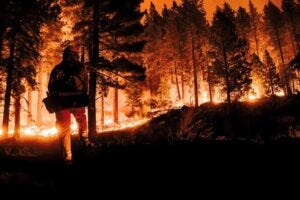Wildfires and Climate Change: The Inconvenient Truth
What the alarmists aren't doing - and what they aren't telling us.
Wildfires and Climate Change: The Inconvenient Truth
What the alarmists aren't doing - and what they aren't telling us.
As with all things environmental, climate alarmists conclude that current wildfires are more evidence of greenhouse gas warming. This must be clarified, as human activities other than driving cars or rearing cows impact these terrible disasters. Appropriate preventive policies are dependent on an accurate diagnosis of cause. The knee-jerk “the sky is falling” pathos furthers the monetary interests of purveyors of polluting renewable technologies but is counterproductive in preventing future conflagrations.
America’s deadliest wildfires occurred over a century ago, when climate change cultism had not eclipsed common sense. Massive fires across the Midwest frontier were the product of vast forests, sloppy logging practices that accumulated debris, and wooden homes that made quick tinder. Some 800 people died in an October 1871 wildfire in Peshtigo, WI, and more than 400 people were killed in fires in Minnesota in 1894 and again in 1918. These were attributed to logging practices.
Anthropomorphic Wildfires?
Such catastrophes were not wild at all but anthropomorphic. The sensible response was to improve logging practices using the knowledge gained, build homes with brick or stone, enact building codes, and implement firefighting practices that extinguish flames promptly in extensive forests. For a time, this was effective, augmented by the timber industry’s decline. Yet this human strategy also carried flaws – extinguishing blazes immediately reduced wildfires in the short term but caused an accumulation of undergrowth as well as a false sense of safety, leading to more homebuilding in fire-prone regions.
It may be that weather changes – human-caused or not – are impacting the frequency or degree of wildfires, but how is that correctly determined if other potential causes are excluded a priori from consideration? Climate alarmists employ a one-issue ideological lens that looks increasingly silly when viewing the kaleidoscope of other potential causes. Do Americans wish to heed Smokey the Bear and prevent forest fires, or increase them recklessly to serve a climate alarmist power grab?
Climate “warriors” do not want to prevent wildfires, as scary fires are the George Floyd counterpart to climate alarmist histrionics. Just as blaming heavy rains and localized heat waves on climate change avoids consideration of the profound impacts of an unprecedented 2022 undersea volcano that more likely explains these disruptions, blaming human-generated greenhouse gases for massive wildfires ducks analysis of other, more likely, anthropomorphic sources. There will be no change in logging and forest management practices or humans risking their lives by building tinderboxes in Hades if the culprit is misidentified as carbon dioxide. In Greece, where some 80 arsonists have been arrested for lighting massive, deadly infernos, arson deniers still seek to label climate change as the primary cause. No firestorm could be more anthropomorphic than one sparked by pyromania. Yet, that cause is an inconvenient truth to those employing even natural fires as a convenient lie about climate change.
Impacts of Rewilding
(Photo by Ty O’Neil/SOPA Images/LightRocket via Getty Images)
Indeed, ill-conceived climate alarmist policies like rewilding (allowing large areas of cleared land to regrow) are doubly foolhardy. Rewilding will increase forest areas to resemble the Midwest a century ago. Human incursions into the wilderness will continue as forests and human habitations expand. Farmland sacrificed to forest growth will require food to be shipped further distances, increasing fossil fuel use and supposed greenhouse effects. Most ludicrous of all, well-managed grasslands sequester far more carbon dioxide than forests – rewilding thus increases greenhouse gas emissions while amplifying the likelihood of more massive blazes. This will then be presented as proof of why more rewilding, not improved forestry practices, is warranted.
A more sensible policy would be to restore confined dairy and beef cows to rotationally graze pastures instead of rewilding them. The extra grass-fed (renewable solar energy) meat could be dispatched to the Amazon to supply farmers with meat so they will stop burning forests there. Of course, farmers clearing lands with anthropomorphic wildfires in Brazil are doing so to survive and to eat: America’s wildfires are surely aggravated by neglect and poor management, then used to further a globalist power-grab that seeks to control all food in the name of climate change.
Effectively Reducing Future Wildfires
Smokey the Bear would wisely say stop stoking wildfires by ignoring best forest management practices and building death-trap houses on the edge of risky areas. Smokey would point out the moral hazards of such human behaviors, akin to building one’s house in a flood zone and then screaming climate change when the seas break in. Rewilding would likely induce Smokey to roll his eyes and repeat the frustrated refrain: “Remember, only you can prevent forest fires!”
Wildfires will decline in frequency and intensity when their true anthropomorphic causes are addressed, not by banning cows for their flatulence, interrupting tennis matches, or gluing hands to famous artworks. Alarmists cultishly fiddle as Rome burns. Not even arsonists deter them from incinerating sensible science.
(Previously published at Liberty Nation.)






The banksters want it, print QE, get it for peanuts and kill more than a few along the way. Enslave the rest. https://youtu.be/Kp24lm2xC1E?si=ssOKz96Ua2YoMB34
Throw this into the mix
Janet Baker Sept. 15,2023
This article offers sensible suggestions and a ‘middle of the road’ approach to conservation. I appreciate such an approach to conservation because it helps us address issues more broadly in terms of solutions, and helps us grow beyond black or white perceptions regarding such issues, avoiding further division between different people that can hinder positive solutions , providing a true “win-win” reality and help us get beyond labels such as political parties, social status, ethnicity, etc. making we the people stronger than political special interest groups.